| |
 |

Organic Acacia
Soluble Fiber
The prebiotic fiber that reduces bloating & gas!

In this Issue...
Food & Recipes
Rx News & Research
Ask Heather
About Us
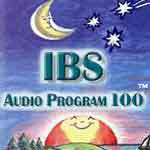
Gut-directed hypnosis is one of the most effective ways to help relieve all IBS symptoms! Results can last more than 5 years.

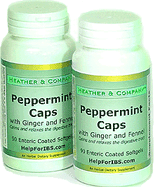
Try Peppermint Caps
Peppermint Caps are the best for abdominal spasms, cramps and pain!

Get the IBS Diet Kit!
With Eating for IBS, plus organic fennel tea for bloating and gas, plus peppermint caps to prevent spasms and pain.
Take control of your IBS!

Get stable now ~
and stay that way!
Did you miss the latest
IBS newsletter and
Lemon Shrimp &
Spinach Fettucine?
Past issues
are posted here!
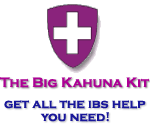
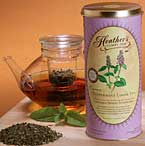
Try Heather's
Peppermint Tummy Tea
Peppermint is a smooth muscle relaxant and has pain-killing properties. Our tea is large leaf with a high volatile oil content - much stronger than tea bags!
 Need help?
Need help?
Have questions?
Come
join the IBS Message Boards!


The IBS Starter Kit!
Learn every way possible to successfully manage your symptoms!
With the First Year: IBS, an essential guide, plus Eating for IBS, plus Acacia Tummy Fiber to start stabilizing immediately!
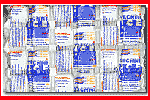
Heat Therapy for
IBS
Hot packs can help prevent stress-related attacks!
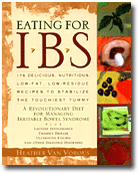
Delicious Recipes
for IBS!
Learn how to eat well and feel better
|
 |
|
| |

IF YOUR NEWSLETTER IS HARD TO READ OR IF THE LINKS DON'T WORK,
Please copy and paste this address into your browser window:
http://www.helpforibs.com/news/newsletter/oatcook022504.html
February 25, 2004
This week ~ Low carb diets & IBS, fiber, and bloating
Hello to everyone -
Our IBS Message Boards have a new moderator, so this newsletter features one of her fabulous recipes! Krees's Oatmeal Molasses Cookies are a real treat, with a moist chewy texture and a spicy ginger kick. Cookies are one of the toughest desserts to make IBS-friendly, but this recipe fits the bill beautifully. It's low fat, dairy free, high soluble fiber, and most importantly of all, it's delicious!
These cookies take just minutes to make, so why not whip up a quick batch and then drop on by the IBS Recipe Exchange to see what else Kree and the rest of us have been cooking? We'd love to see you there. And, as always, we have the latest IBS and digestive health news, research, and studies as well, so enjoy.
Best Wishes,
Heather Van Vorous
Note: Did a friend send you this newsletter? Sign up here for your own free subscription.
 Oatmeal Molasses Cookies
Makes about 30 cookies
Oatmeal Molasses Cookies
Makes about 30 cookies
1/4 cup non-hydrogenated soy margarine (such as Soy Garden or Organic Spectrum), softened
3/4 cup sugar
1/4 cup molasses
2 egg whites or 1/4 cup Egg Beaters
1 teaspoon vanilla extract
1 3/4 cups unbleached white flour
1/2 teaspoon baking soda
1/2 teaspoon salt
1 teaspoon cinnamon
1/2 teaspoon ground ginger
1 cup oats, uncooked
In a large bowl, cream margarine with an electric mixer; gradually add sugar, beating at medium speed until well blended. Add molasses, egg whites and vanilla; beat well.
Sift and whisk flour and remaining ingredients (except oats) in a medium bowl, then stir in oats, blending well. Gradually add flour mixture to creamed mixture, stirring well to combine.
Drop dough by level tablespoonfuls, 2 inches apart, onto cookie sheets coated with cooking spray. Bake at 350F for 12-13 minutes or until very lightly browned. Cool slightly on cookie sheets. Remove from cookie sheets and cool completely on wire racks.
Thanks Kree!
For oodles of delicious recipes, come visit the IBS Recipe Exchange Message Board!
Are you just learning how to eat for IBS? A little intimidated at the thought of special IBS recipes? Don't worry! Come see
the IBS Diet pages, and find the answers to all your questions.
 Low Carb Diets are a Prescription for Prebiotics
Low Carb Diets are a Prescription for Prebiotics
The Atkins Diet and similar low carbohydrate diets are causing a major change in dietary habits. Excessive weight gain is a serious public health epidemic; however, strict adherence to the low carbohydrate, high protein diets for more than a few months can cause some serious health complications.
The Atkins Diet curtails the consumption of a variety of foods that provide thousands of health promoting compounds (nutraceuticals) that help prevent many diseases. Also, these diets can provide too much protein, which taxes the kidneys, and too much fat, which leads to higher blood lipid levels and cardiovascular disease. Finally, the Atkins Diet significantly reduces the recommended amount of dietary fiber participants consume. Adherence to a low carbohydrate diet which significantly reduces the variety of foods consumed could lower dietary fiber intake to less than 25% of recommended amounts, and this can lead to serious health complications such as constipation, diverticulosis, and intestinal cancers.
Dietary fiber is simply the carbohydrate portion of the diet that is nondigestible and is commonly described as consisting of insoluble and soluble fractions. Examples of insoluble dietary fiber are cellulose, hemicellulose, and wheat bran. When insoluble dietary fiber reaches the large intestine, it undergoes partial fermentation.
However, soluble dietary fiber such as guar gum, Acacia (gum arabic), pectin, and alginates undergo almost complete fermentation. Due to the extent of the fermentation, gums contribute 0 net carbohydrates to the diet because the carbohydrate portion is soluble dietary fiber. Once fermented, soluble fiber becomes "the" important source of energy for intestinal bacterial growth.
The relatively new term (1995) used to describe soluble dietary fiber or gums is "prebiotic." A more scientific definition of a prebiotic is "a nondigestible food ingredient that beneficially affects the host by selectively stimulating the growth and/or activity of one or a limited number of bacteria in the colon, and thus improves host health".
As prebiotics are fermented in the large intestine, more short chain fatty acids (SCFA) (i.e., acetic, propionic, and butyric) are produced. The SCFA decrease the pH of the large intestine favoring the growth of more non-pathogenic organisms (Lactobacillus and Bifidobacteria sp) compared to pathogenic organisms (i.e., Proteus and Staphylococci sp). These changes in the large intestine, brought about by increased fermentation of prebiotics, leads to increased disease prevention.
Check here for more
information...
Eating for IBS and Fibromyalgia
Irritable Bowel Syndrome is estimated to affect 15-20% of the general population, but a much higher percentage of people with Fibromyalgia suffer from IBS. The symptoms of IBS (abdominal pain in association with altered bowel motility, diarrhea, constipation, bloating, and gas) can range from minor to debilitating, but the good news is that IBS can be very well-controlled through diet. Even better news is that the proper IBS diet is not just healthy but delicious, and in particular, "comfort foods" adapted for IBS are not simply emotionally soothing but can actually physically calm the gut as well.
Because fibromyalgia can require some dietary restrictions in its own right, it's helpful to know that these can easily be incorporated into the IBS diet. Acid-forming foods such as red meat and dairy that are problematic for the joint pain of fibromyalgia are completely avoided when you're eating for IBS. Stimulants like black tea and coffee are easily replaced with herbal teas that actively aid digestion, such as peppermint, fennel, chamomile, and anise. Foods in the deadly nightshade family (potatoes, tomatoes, bell peppers, eggplants) are simply replaced with other vegetables. Refined table sugar, a stimulant which can negatively affect fibromyalgia, is not a problem for IBS (though certain sugars, such as fructose and lactose, often are) but neither is it helpful, so it can simply be omitted from your diet. Unrefined sugars such as maple syrup or honey may be more tolerable, or stevia can be used. Acidic foods such as citrus and vinegar are often as problematic for IBS as for fibro, and again easy substitutions can be made.
Data Links Crohn's Disease and Antibiotics
Use of antibiotics is a potential risk factor for the development of Crohn's disease, according to a paper published in the February issue of the journal Gut.
Researchers at England's University of Nottingham and Cambridge University analyzed the British General Practice Research Database for information about antibiotic use of those with and without the disease. The database includes information about diagnosing and prescribing practices of 5% of the nation's physicians and is considered to be one of the world's largest computerized databases of longitudinal anonymous patient medical records from this setting.
The researchers found that those with Crohn's received twice as many prescriptions over a five-year period and were 30% more likely to have been prescribed antibiotics. Although Crohn's disease is primarily regarded as a genetic condition, researchers have been hunting for environmental reasons why the disease has increased significantly over the past few decades. Antibiotics are just one of many environmental triggers being scrutinized, along with factors such as appendectomies, the birth control pill, and smoking.
Check here for more
information...
Celiac Disease is a Risk Factor for Schizophrenia
People with a history of the digestive disorder celiac disease are three times more likely to develop schizophrenia than those without the disease, according to a report by Danish researchers and a researcher at the Johns Hopkins Bloomberg School of Public Health. Celiac disease is an autoimmune disorder that impairs the body's ability to digest the protein gluten, which is found in grains and many other foods. Gluten intolerance can erupt at any age but mostly affects people between the ages of 30 and 45, often causing weight loss, diarrhea and fatigue. "A history of coeliac disease is a risk factor for schizophrenia," the researchers wrote in an article for the British Medical Journal.
Check here for more
information...
McDonald's Has A Beef with Movie Documentary
In the new documentary "Super Size Me," filmmaker Morgan Spurlock eats only McDonald's food for 30 days and documents his rapidly deteriorating health.
Interspersed with segments about obesity and processed food in the United States, viewers watch Spurlock pack on 25 pounds, ride out wild mood swings and get warnings from doctors about his rising cholesterol levels and liver toxicity. The movie will be released to theaters by the end of May.
The 90-minute movie could cause more people to bring obesity lawsuits against McDonald's Corp., predicts John Banzhaf, a professor at George Washington Law School.
Check here for more
information...
Detox Diets: Fasting and "Cleansing" Not Necessary
It's a compelling argument: The very veggies we eat, the air we breathe, even our drinking water is full of toxins. So ridding the body of toxins is surely a good thing, right? Not everyone agrees.
That's the premise of detoxification diets, better known as detox diets. For many people, detoxing is a ritual form of spring cleansing. However, while the theories behind detox diets may sound beneficial, they are controversial. Some experts say they're pointless, sometimes even dangerous.
"There's no scientific evidence to support the claims made for [detox diets]," says alternative-medicine guru Andrew Weil, MD.
Check here for more
information...
Looking for the latest IBS research and news?
Check out the IBS Research Library!
 Common Pitfalls ~ The Seven Sneaky Deadly Sins of the IBS Diet
Common Pitfalls ~ The Seven Sneaky Deadly Sins of the IBS Diet
"I'm following the Eating for IBS diet, but I still have problems. What am I doing wrong?"
I hear from many people who have made a great effort to modify their diet for IBS, but who still have abdominal symptoms they feel certain are associated with their eating habits. They're often very frustrated because they believe that there aren't any steps left for them to take. The good news here is that it's much more likely than not that there are still dietary triggers involved, they're simply being overlooked.
I've found that there are seven specific pitfalls that ensnare many people as they adjust their diet - let's call them the Seven Sneaky Deadly Sins of the IBS Diet:
1. Coffee (yes, decaf counts)
2. Yogurt (it's the safest dairy product for IBS...isn't it?)
3. Alcohol (just one glass of wine is okay, right?)
4. Vitamin supplements (they're good for you, aren't they?)
5. No insoluble fiber foods (they're triggers, so you just don't eat them, right?)
6. Too low a dosage of soluble fiber supplements
7. Not drinking enough water (doesn't soda pop count?)
Fifth on the list is...
#5. Since most raw fruits, vegetables, and whole grains have a lot of insoluble fiber, and that's a big trigger for my IBS symptoms, I don't eat these foods at all anymore. Is that okay?
Nope, it's definitely not a good idea to simply avoid insoluble fiber foods altogether. Insoluble fiber is found in fresh fruits, vegetables, whole grains, legumes, and nuts, and you can tell at a glance that these are among the very healthiest foods in the world. If you don't eat them you're setting yourself up for serious long-term health problems.
However, if you have IBS, insoluble fiber is a huge potential trigger, and your colon simply can't handle it if you eat these foods with abandon. You can (and absolutely must) eat insoluble fiber foods, as often and as much as safely possible, but within the IBS dietary guidelines. Treat insoluble fiber foods with suitable caution, and you'll be able to enjoy a wide variety of them, in very healthy quantities, without problem.
The number one rule here is: Never eat insoluble fiber alone or on an empty stomach. Always eat it with a larger quantity of soluble fiber, and you will help keep your IBS stable.
The second rule to remember here is that while you should be having lots of fresh fruits and veggies every day, make sure you cook, peel, chop, seed, dice, and/or puree most or even all of them. Peeling and seeding fruits and veggies will remove the toughest insoluble fiber altogether. Chopping, cooking, and pureeing will mechanically break down the insoluble fiber in fruits, vegetables, beans, and nuts before you eat it, making it much less likely to provoke problems.
If you're just starting to re-incorporate insoluble fiber into your diet, the best way to begin is to blend fresh fruits into smoothies with a bit of soy or rice milk. Use a base of bananas, mangoes,
and/or frozen peaches for soluble fiber, and add just a handful of strawberries, blueberries, cherries, and/or pineapple. Blend the drink until totally smooth and you'll really minimize the insoluble fiber. Blend cooked fresh veggies into soups or sauces, and serve over rice or noodles. This is an especially good way to incorporate greens, which are highly nutritious but also some of the most difficult insoluble fiber veggies for most IBS folks.
It's also helpful to make sure you're already eating as much of the healthiest soluble fiber foods as possible: root veggies (sweet potatoes, pumpkin, beets, rutabagas, carrots, etc.), mangoes, bananas, peeled apples and peeled pears, peeled peaches and apricots, and avocados.
See how do you do with brown rice, oatmeal, and barley. These tend to be the best tolerated whole grains for IBS. Try adding in small amounts of well-cooked and pureed beans or lentils as soup or dip additions to your diet. Take this process slowly, and you can actually significantly increase your tolerance of legumes. Your body will produce the enzymes you need to digest bean sugar (raffinose) if you're eating beans on a regular basis. If beans consistently give you problems, try lentils instead, as they're often easier to digest. Finely grinding nuts and adding them to a soluble fiber foundation is an easy and safe way to incorporate another very healthy variety of insoluble fiber. Try adding Beano to all of your insoluble fiber foods, eat these foods in tiny amounts at first, then gradually and consistently increase your quantities.
Try baking easy, low fat quick breads such as zucchini bread, carrot cake, pumpkin bread - this is a terrific (and delicious!) way to add fruits and veggies safely.
Take this whole process slowly and gradually, and remember that if you've been totally avoiding insoluble fiber foods you're going to have to start eating them carefully, and giving your body time to adjust. You will increase your tolerance for these foods and digest them better the more
you eat them, as long as you follow the guidelines.
It can be tremendously helpful to take Acacia or another soluble fiber supplement right before you eat insoluble fiber foods. If you find herbal teas such as peppermint, fennel, chamomile, or ginger helpful drink those with the foods, and try taking Peppermint Caps as well. All of these things will help keep your gut stable and let you tolerate the addition of insoluble fiber foods. For the sake of your overall health, making a real effort here is well worth it. As always with IBS, the more you can take pro-active steps to prevent problems in the first place, the better off you'll be.
Check here if you're still not clear about what, exactly, insoluble fiber is and how it affects IBS. You can also take a look at IBS safe recipes that offer good examples of how to safely incorporate insoluble fiber into your daily diet.
Coming next...#6 on the list of the Seven Sneaky Deadly Sins of the IBS Diet!
 Heather & Company for IBS, LLC is dedicated to serving people with Irritable Bowel Syndrome. Our mission is to provide education, support, and products that allow people with IBS to successfully manage their symptoms through lifestyle modifications.
Heather & Company for IBS, LLC is dedicated to serving people with Irritable Bowel Syndrome. Our mission is to provide education, support, and products that allow people with IBS to successfully manage their symptoms through lifestyle modifications.
We offer extensive information and tangible help for IBS, including the world's best-selling and best-reviewed books for the disorder. We provide the internet's top IBS web site resources; a twice-monthly IBS Newsletter; seminars and classes; dietary brochures for patient distribution by health care professionals; an IBS Research Library; and Heather Cooks!, a healthy cooking show on Seattle television. Much of our work is based on Heather's development of the first and only comprehensive IBS dietary guidelines and recipes, an achievement which has earned numerous awards and accolades as well as thousands of thank you letters from IBS sufferers.
Heather & Company also provides the only patient-expert moderated IBS Message Boards on the internet with forums for diet, recipes, hypnotherapy, yoga, plus Crohn's and Colitis. In addition, we support and coordinate the formation and continuation of local in-person IBS support groups across the USA, Canada, the UK, Australia, and New Zealand. We will soon have other IBS services and products available.
Our website receives over 2 million visits each year, and our newsletter is sent to over 20,000 people. We are regular exhibitors at the Digestive Disease Week and American Dietetic Association conferences.
Sponsorship opportunities are available for the message boards and this newsletter for companies and/or products that have been legitimately established as helpful for digestive disorders.
Please contact us for information.

You are receiving this email because you have expressed interest in IBS news and information.
To unsubscribe from Heather's IBS Newsletter, click here http://www.helpforibs.com/news/unsub.asp or send an email to heather@helpforibs.com.
If you are viewing this newsletter on a website and would like to subscribe for email delivery, please "Join the IBS Newsletter" here.
ANTI-SPAM PRIVACY POLICY
LEGAL DISCLAIMER - This email is not intended to replace the services of a physician, nor does it constitute a doctor-patient relationship. Any application of the recommendations in this email is at the reader's discretion. Heather Van Vorous and Heather & Company for IBS, LLC are not liable for any direct or indirect claim, loss or damage resulting from use of this email and/or any web site(s) linked to/from it. Readers should consult their own physicians concerning the recommendations in this email.
Heather & Company for IBS, LLC
409 10th Avenue East Suite 202
Seattle, WA 98102 USA
© 2004 Heather & Company for IBS, LLC. All rights reserved.
|
|
|
|